新关于英语听力的调查研究
- 格式:pdf
- 大小:331.66 KB
- 文档页数:8

第10卷第5期2010年5月宜宾学院学报Jou rnal of Yibin U niversity Vol .10,№5M ay,2010收稿日期:2010-04-14基金项目年度浙江省高校优秀青年教师资助计划项目作者简介郎晓娟(),女(满族),辽宁丹东人,硕士,讲师,主要从事美国文学及英语教学研究。
地方高校新生英语听力学习状况调查与学习策略———以湖州师范学院为例郎晓娟(湖州师范学院外国语学院,浙江湖州313000)摘要:通过问卷调查的方式,对湖州师范学院新生的听力学习状况,以及听力学习过程中最常用、最不常用的听力学习策略进行了问卷调查。
结果显示:听力在新生的英语基本技能学习中得到进一步重视,但学生在学习策略方面尚有改进的余地。
因此,需要教师的积极介入,提高学生自主学习的能力;通过针对性训练,提高学生运用策略的能力,从而提高他们的听力水平。
关键词:英语教学;听力水平;教学策略中图分类号:H319.9 文献标识码:A 文章编号:1671-5365(2010)05-0086-03 近年来,随着大学英语教学改革工作的深入推进,大学英语的教学内容、教学模式以及考试内容等方面都发生了巨大的变化。
根据《大学英语课程教学要求》,教学内容的重点由原来的“以阅读写作为主”转移为“以提高听说能力为主”;教学模式由原来的“课堂教学为主”转变为“基于计算机和课堂”。
〔1〕考试内容方面,“如果我们把听力视为英语实用能力发展的瓶颈,则我们的试题设计必须是基于听力的”。
〔2〕3由此可见,大学生英语听力能力越来越受到广泛的重视。
有效地提高学生英语听力能力已成为大学英语教学研究的一个重要课题。
20世纪80年代,一些国内专家便开始了对听力策略的研究。
到了90年代,虽然听力策略对听力水平提高的有效性得到了肯定,但专门调查听力策略的研究尚不多见。
〔3〕5王立非和文秋芳认为,策略训练的目的不在掌握策略的本身。
而在于提高学习者的策略意识、增加他们策略的选择范围、锻炼和培养他们自我监控和自我调节的能力。
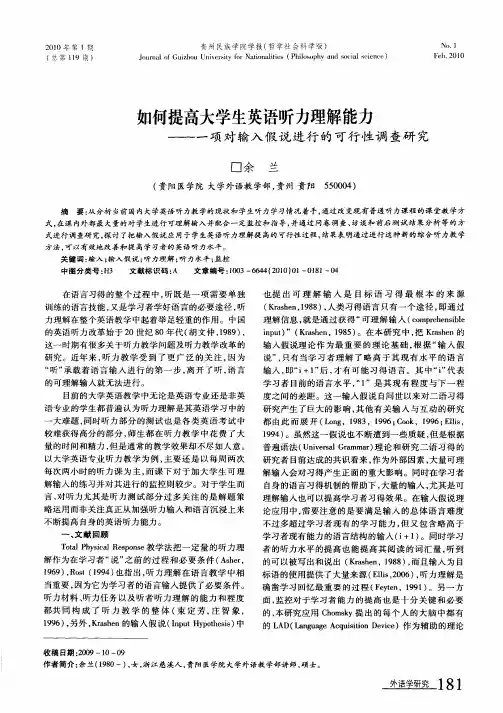
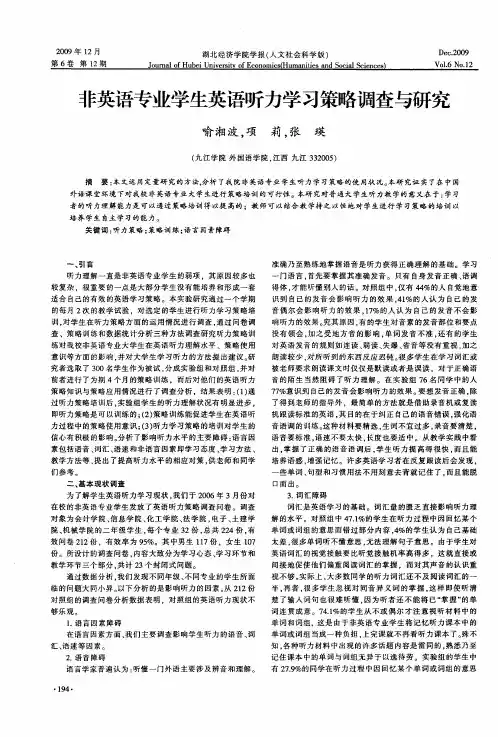
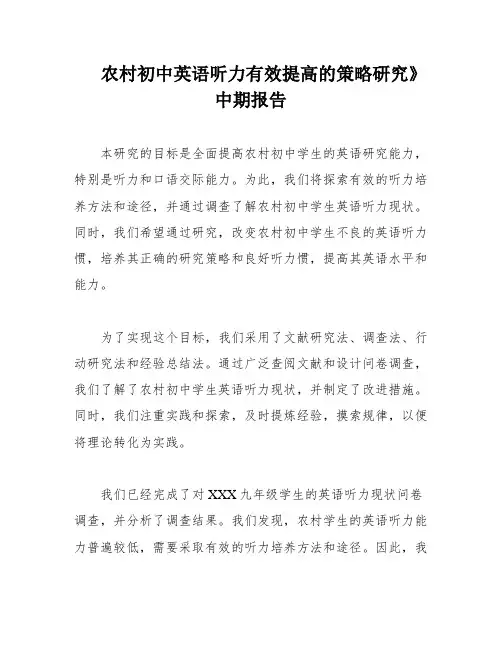
农村初中英语听力有效提高的策略研究》中期报告本研究的目标是全面提高农村初中学生的英语研究能力,特别是听力和口语交际能力。
为此,我们将探索有效的听力培养方法和途径,并通过调查了解农村初中学生英语听力现状。
同时,我们希望通过研究,改变农村初中学生不良的英语听力惯,培养其正确的研究策略和良好听力惯,提高其英语水平和能力。
为了实现这个目标,我们采用了文献研究法、调查法、行动研究法和经验总结法。
通过广泛查阅文献和设计问卷调查,我们了解了农村初中学生英语听力现状,并制定了改进措施。
同时,我们注重实践和探索,及时提炼经验,摸索规律,以便将理论转化为实践。
我们已经完成了对XXX九年级学生的英语听力现状问卷调查,并分析了调查结果。
我们发现,农村学生的英语听力能力普遍较低,需要采取有效的听力培养方法和途径。
因此,我们将继续深入研究,探索更好的方法和途径,以提高农村初中学生的英语研究水平和能力。
根据问卷调查、访谈和观察,我得出以下结论:首先,在英语研究方面,学生可能会遇到语音障碍。
有些学生可能一开始就没有掌握每个单词的准确发音,这会导致对于发音相近的词,如sheep---ship。
house---horse等,不能正确辨别一些容易混淆的音素。
其次,语速障碍也是一个问题。
有些英语教师讲课语速比较慢,学生形成了惯,遇到正常语速的听力材料就不能适应。
而且,一些语音语调的变化,如连读、弱读、重读、失爆、重音转移等,更是让学生无所适从。
此外,英美英语在读音上也存在差异,有些读音差别还相当大。
由于我国英语教学过去基本上采用英国英语教学体系,因此,有些学生因不熟悉英美语音的差异,就产生了听力障碍。
还有一个问题是词汇障碍。
学生英语词汇量的大小、掌握的熟练程度、一词多义和同音异义的现象,都会给学生听力理解造成一定的困难。
此外,母语干扰也是一个常见的障碍。
许多学生在听到一段语音信息后,常受母语干扰,惯用中文逐句逐词翻译出来,而不能直接将语音信息转化为一定的情景,不能直接用英语进行思维,这种心译影响了反应速度和记忆效果。
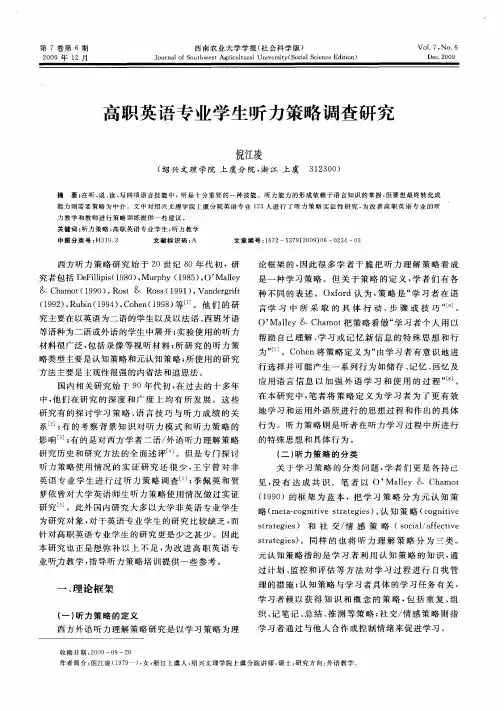


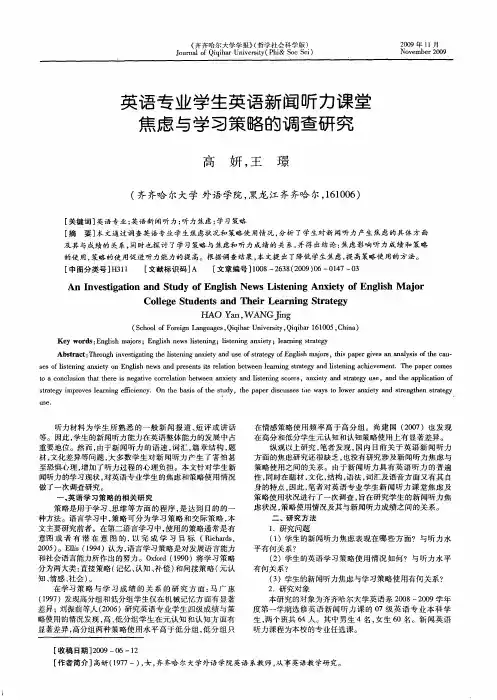
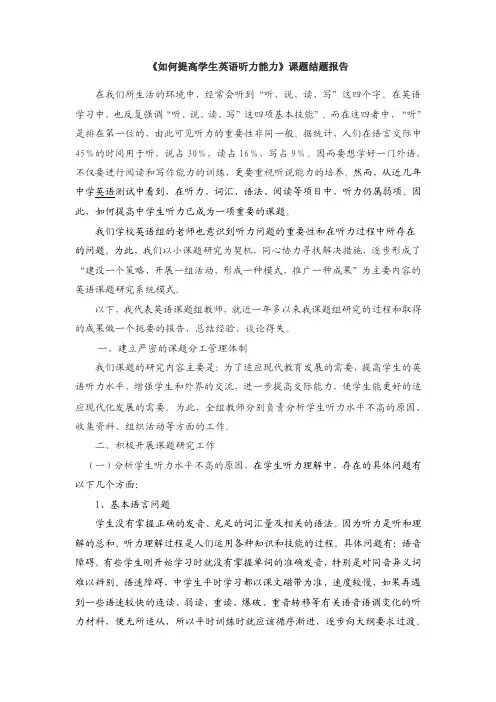
《如何提高学生英语听力能力》课题结题报告在我们所生活的环境中,经常会听到“听、说、读、写”这四个字。
在英语学习中,也反复强调“听、说、读、写”这四项基本技能”。
而在这四者中,“听”是排在第一位的,由此可见听力的重要性非同一般。
据统计,人们在语言交际中45%的时间用于听,说占30%,读占16%,写占9%。
因而要想学好一门外语,不仅要进行阅读和写作能力的训练,更要重视听说能力的培养。
然而,从近几年中学英语测试中看到,在听力、词汇、语法、阅读等项目中,听力仍属弱项。
因此,如何提高中学生听力已成为一项重要的课题。
我们学校英语组的老师也意识到听力问题的重要性和在听力过程中所存在的问题。
为此,我们以小课题研究为契机,同心协力寻找解决措施,逐步形成了“建设一个策略,开展一组活动,形成一种模式,推广一种成果”为主要内容的英语课题研究系统模式。
以下,我代表英语课题组教师,就近一年多以来我课题组研究的过程和取得的成果做一个扼要的报告,总结经验、谈论得失。
一、建立严密的课题分工管理体制我们课题的研究内容主要是:为了适应现代教育发展的需要,提高学生的英语听力水平,增强学生和外界的交流,进一步提高交际能力,使学生能更好的适应现代化发展的需要。
为此,全组教师分别负责分析学生听力水平不高的原因、收集资料、组织活动等方面的工作。
二、积极开展课题研究工作(一)分析学生听力水平不高的原因,在学生听力理解中,存在的具体问题有以下几个方面:1、基本语言问题学生没有掌握正确的发音、充足的词汇量及相关的语法。
因为听力是听和理解的总和。
听力理解过程是人们运用各种知识和技能的过程。
具体问题有:语音障碍。
有些学生刚开始学习时就没有掌握单词的准确发音,特别是对同音异义词难以辨别。
语速障碍,中学生平时学习都以课文磁带为准,速度较慢,如果再遇到一些语速较快的连读、弱读、重读、爆破、重音转移等有关语音语调变化的听力材料,便无所适从,所以平时训练时就应该循序渐进,逐步向大纲要求过渡。
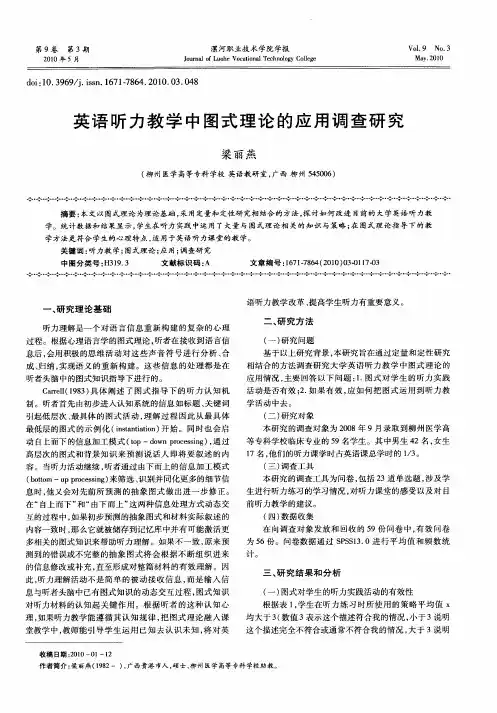
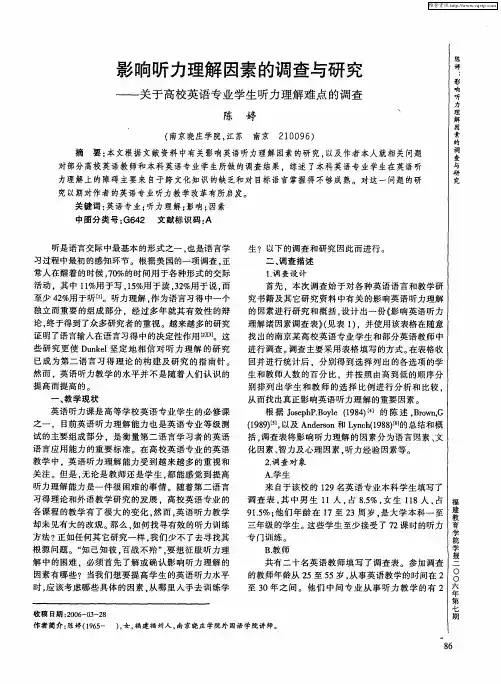
- 85 -●●调查及研究报告基金项目: 海南省高等学校教育教学改革研究资助项目“基于多模态理论的大学英语听力教学模式改革问题与对策研究”(项目编号:Hnjg2017-30)。
作者简介: 游戚东梦,汉族,湖南邵阳人,海南师范大学外国语学院,讲师,硕士研究生,研究方向:应用语言学;刘忠喜,汉族,吉林松原人,海南师范大学外国语学院,副教授,博士研究生,研究方向:英美文学。
多模态话语分析理论视角下大学英语听力教学的现状调查研究——以海南师范大学为例游戚东梦,刘忠喜(海南师范大学外国语学院,海南 海口 571158)摘 要:基于多模态话语分析理论,通过问卷调查,发现大学英语听力教学存在诸多问题。
文章认为大学英语听力教学应批判性地使用多媒体技术和多模态资源,在教学内容、结构、活动设计上做调整,多方位刺激学生的学习体验,提升学习效率和趣味性。
关键词:多模态话语分析理论;大学英语听力教学;现状调查一、背景2017年教育部发布的新版《大学英语教学指南》明确提出对大学英语学习者听力能力的要求。
但传统教学问题诸多,需要引进新思路、新方法。
随着科技发展带来的多模态化学习环境,加之听力学习本身具有的多模态特性,多模态话语分析理论应能为打破传统教学方式、提升教学质量提供优势。
二、多模态话语分析理论与大学英语听力教学多模态话语是指运用听觉、视觉、触觉等多种感觉,通过语言、图像、声音、动作等多种手段和符号资源进行交际的现象,多模态话语分析将多种媒体和多种模态相结合以进行话语分析。
数字技术的发展不仅促进了人类交际模式的多模态化,也因此促进了外语教学的多模态化以及相关研究的发展。
多模态话语分析理论视域下的有关大学英语听力教学的各种研究都证明该理论的积极作用。
但实际上,学生的反馈却不尽如人意,教学问题诸多。
事实上,模态选择和使用以及授课对象的变化都会影响教学效果。
因此,有必要调查大学英语听力教学现状,发现问题、找出原因,再提出有针对性的建议。
大学生英语听力焦虑调查研究[摘要]:本文对198名非英语专业大学生的听力焦虑进行调查研究,笔者运用spss17.0统计软件对听力焦虑问卷数据和听力测试成绩数据进行了统计分析。
结果表明:听力焦虑中的自我信念因子、听力技能因子与听力成绩之间存在着显著相关性。
研究同时对大学英语听力教学提出建议。
[关键词]:自主听力听力焦虑调查研究基金项目:四川省应用外语研究会项目(sw-w201103)阶段性成果,攀枝花学院教研教改项目(jj1130)阶段性成果。
1. 研究背景语言学习中的焦虑问题自提出以来一直受到外语教学人员的关注。
关于焦虑量表的使用,研究人员较多采用的是horwitz(1986)设计的外语课堂焦虑量表(flcas)。
现有大多数研究成果一致认为外语学习焦虑会对学习者的学习成绩产生负面影响,即焦虑越高则学习成绩越低。
可见焦虑对外语学习者的学习过程和结果存在着不可忽视的影响。
英语听力能力是影响学习者语言综合应用能力的重要因素,也是直接影响用英语进行交际的决定性因素。
对学习者的听力焦虑进行专项研究意义重大。
陈艳君(2010)等对听力焦虑的成因进行了专项研究,指出紧张感、技巧缺乏、背景生疏、英语水平和材料难度是学习者听力焦虑的主要成因。
这一研究对于揭示听力焦虑的来源具有重要意义。
现有最具权威性的听力焦虑测量工具是elkhafaifi(2005)设计的外语听力焦虑量表(fllas)。
张宪(2011)等对这一量表进行了构造分析和效度检验,并用优化后的听力焦虑量表对165名英语专业学生进行了跟踪研究。
张宪等的研究是针对高水平(广外)的英语专业学生,但一般本科院校非英语专业学生的听力焦虑情况如何,他们的听力焦虑和高水平的英语专业学生有何异同。
本文主要针对这一问题进行研究。
2. 研究方法2.1 研究问题研究主要回答以下问题:1)非英语专业大学生的英语听力焦虑现状如何?2)听力焦虑三因子和听力成绩之间是否存在较大的相关性?2.2 研究对象研究对象为四川某理工类院校的大学一年级下学期学生,共198人。